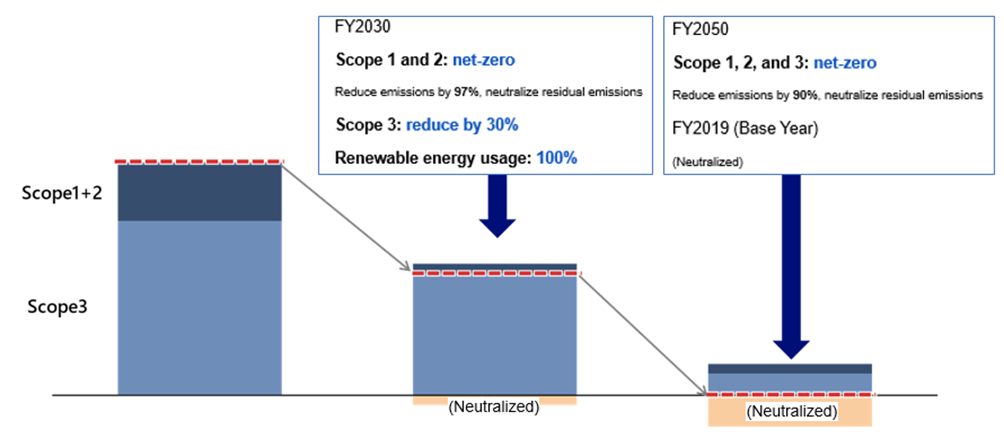Tokyo, February 24, 2023 – Nomura Research Institute, Ltd. (Headquarters: Tokyo, Japan; Chairman, President & CEO Shingo Konomoto, “NRI”) announced today that it set a new target this February to achieve net-zero1Scope2 1, 2, and 3 greenhouse gas emissions by FY2050. This target was set in accordance with the “Corporate Net-Zero Standard3” published by the “Science Based Targets (SBT) initiative”4, an international environmental body.
The NRI Group initially set a greenhouse gas emission reduction target back in February 2021, and it was certified by the SBTi as being in line with the 1.5°C global heating target. 5 Subsequently, with the movement to decarbonize entire supply chains accelerating across the world, the SBTi clarified its net-zero standard in October 2021. In response, we have now set a new target in keeping with this standard (NRI’s application for SBTi certification under the new target is currently pending).
Chart: NRI Group’s New Environmental Target (Established February 2023)
| Target Scope | New Environmental Target | |
|---|---|---|
| FY2030 | FY2050 | |
| Scope1+2 |
NRI Group’s
greenhouse gas emissions
(Scope 1 and 2): net-zero* (vs. FY2019) * Reduce emissions by 97%, neutralize 6 residual emissions 7 NRI Group’s renewable energy usage: 100% |
NRI Group’s
greenhouse gas emissions
(Scope 1, 2, and 3) net-zero *(vs. FY2019) * Reduce emissions by 90%, neutralize residual emissions |
| Scope3 |
NRI Group’s
greenhouse gas emissions (Scope 3)
30% reduction (vs. FY2019) |
|
Figure: Trends (Targets) in NRI Group’s Greenhouse Gas Emissions Based on New Environmental Targets

To reduce our Scope 1 and 2 emissions, NRI’s three main data centers switched to using electricity derived from renewable energy sources in FY2021.
8
In addition, to help reduce our Scope 3 emissions, we are providing support with reduction efforts across our entire supply chain, including by holding workshops to set environmental targets for our business partners.
The NRI Group has cited “contributing to the global environment by collaborating with business partners” as one of the material issues (materiality) that we reset in FY2022, and we will aim to spread these environmentally friendly initiatives throughout our supply chain to contribute to the creation of a sustainable future society. To that end, we will not only continue promoting our existing initiatives, but also make more intensive use of renewable energy and work more closely with our clients and business partners going forward, to further elevate our efforts toward achieving net-zero emissions.
Under its philosophy, “Dream Up The Future”, the NRI Group will continue to address environmental challenges and other social issues, by working together with various stakeholders in creating new value and thereby contributing to the creation of a sustainable society.
-
1
Net-zero:
a balancing of man-made greenhouse gas emissions and the amount removed from the air, so that the net amount of such emissions in the atmosphere is zero. -
2
-
Scope :
Target scope of calculation/reporting for greenhouse gas emissions by corporations.
-
Scope 1:
Direct emissions such as those from fuel combustion
-
Scope 2:
Indirect emissions such those arising from the use of electricity, heat, and steam
-
Scope 3:
Indirect greenhouse gas emissions other than those falling under Scopes 1 and 2, such as emissions from manufacturers in the supply chain, employee commuting, business travel, etc
-
Scope :
-
3
Corporate Net-Zero Standard:
A standardized framework published by the Science Based Targets Initiative in October 2021, designed to help limit the global temperature rise to 1.5°C above pre-industrial levels and reach net-zero CO2 emissions by 2050. -
4
Science Based Targets initiative (SBTi):
An initiative to promote the achievement of science-based targets for reducing greenhouse gas emissions by companies in order to limit the rise in global temperatures from pre-industrial times to below 2°C. The SBTi was established by four organizations: CDP, which is a federation of institutional investors promoting disclosures on climate-change countermeasures; the UN Global Compact (UNGC); the World Resources Institute (WRI); and the World Wildlife Fund ( WWF).- SBT initiative website (English): https://sciencebasedtargets.org/
-
5
“NRI Group's Greenhouse Gas Emissions Reduction Target Certified by the Science Based Targets Initiative as Conforming to 1.5°C Target – Aims to Reduce Greenhouse Gas Emissions by 72% in FY2030 Compared to FY2013 Level”
NRI News Release: https://www.nri.com/jp/news/info/cc/lst/2021/0224_2 -
6
Neutralization:
The use of carbon-removing technologies etc. to offset residual emissions, outside the supply chain. -
7
Residual emissions:
Non-reducible emissions that still remain within a company group’s supply chain after efforts to reduce emissions in all scopes. -
8
NRI Promotes Efforts for Carbon Neutral Data Centers - Starting Operations on Electricity Derived from Renewable Sources
NRI News Release: https://www.nri.com/en/news/newsrelease/lst/2022/cc/0126_2
For Reference
■ NRI’s sustainability-related initiatives
- Website https://www.nri.com/en/sustainability
- Integrated Report https://ir.nri.com/en/ir/library/report.html
- ESG Databook https://www.nri.com/en/sustainability/library/back_number
- Sustainability Book https://www.nri.com/en/sustainability/library/back_number
- NRI Group’s key measures and emissions record toward achieving environmental targets https://www.nri.com/en/sustainability/environment/data
Inquiries
Inquiries about this news release:
Sangi Tamaoka
Corporate Communications Department
Nomura Research Institute, Ltd.
Tel: +81-3-5877-7100
E-mail:
kouhou@nri.co.jp
Inquiries about this certification:
Eiko Ibuki, Tomoko Takahashi
Sustainability and Responsibility Group
Nomura Research Institute, Ltd.
E-mail:
41sustainability@nri.co.jp